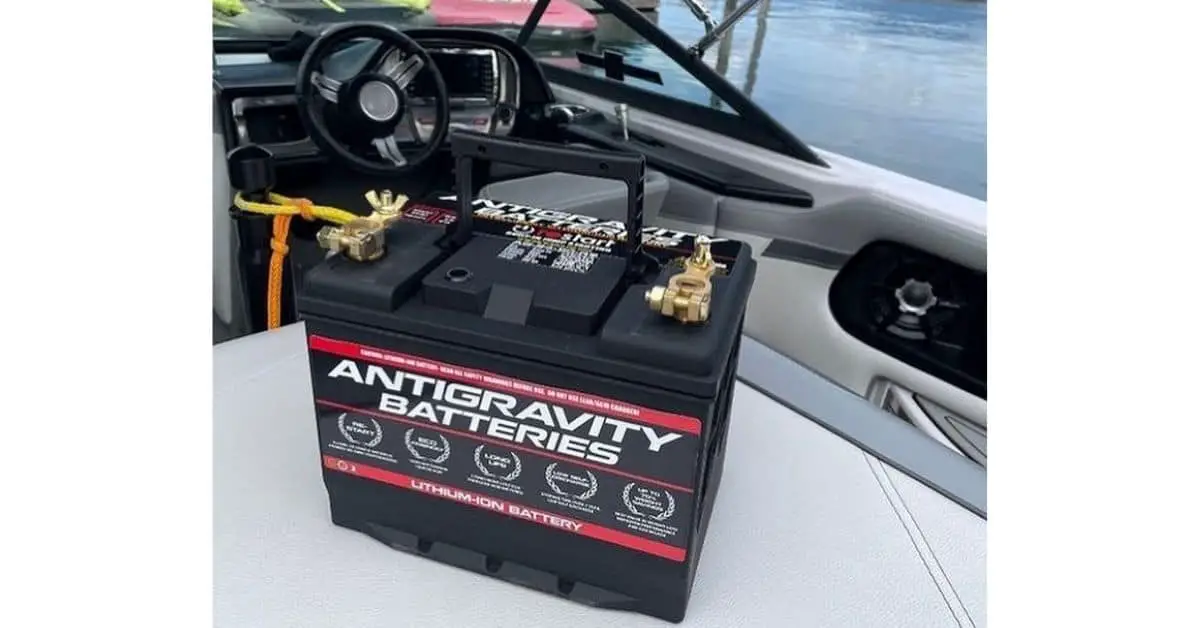Just because you turned your boat’s motor off, it doesn’t mean the battery isn’t still getting drained. Bilge pumps, radios, and lights are a few examples of things that could still use power even when your boat is off. Knowing this lets us answer the question.
So, you shouldn’t disconnect your battery if you are leaving your boat in the water. This is because your bilge pump needs power to keep water out of your boat. You should disconnect your battery if you plan on keeping your boat on land (garage, storage, etc.). Marine batteries will last around 2-3 weeks when connected to your boat and about 5 months when disconnected.
If you plan on leaving your boat in the water for over a week, I would recommend you have a way to charge the battery. The most common way I do this is by connecting the boat to the power provided by your marina through a cord. You could also get solar panels or a trickle charger as well. Click here to skip down to the subheading where I talk about this more.
How to disconnect your boat battery?
The hardest part when disconnecting your boat battery is finding the battery itself. You may have to use your boat’s manual to find it. Once found, follow these steps:
Step 1) Get an adjustable wrench such as this one on Amazon or one that will fit the terminal bolts properly.
Step 2) Although not required, it’s highly recommended to put on latex gloves.
Step 3) Open the battery compartment (you may need to remove hold-down straps).
Step 4) Use your wrench and unscrew the bolt on the negative terminal (usually black wire) until you can pull the cable off.
After following these steps, your battery will be disconnected and no power will be drawn from it.
If you want to make this process easier, you can install a battery disconnect switch. Click here to go down to the subheading I talk about this more.
Should you remove boat batteries in winter?
To extend your marine battery’s lifetime, it’s best to take them out and store them properly for the winter. However, as long as the temperature doesn’t fall below freezing, you can leave the batteries in your boat during winter.
For most batteries, you want to charge them fully before putting them into storage. Recharge them back to full every time they drop below 75% charge. For lithium-ion batteries, you should only charge them to around 50% before storing them. Recharge them back to 50% if it drops below 40% charge. (Source)
The ideal temperature for storing your boat battery is around 50°F-60°F (10°C-16°C). You shouldn’t store them in anything higher than 100°F (38°C) or lower than 32°F (0°C)
How to remove/replace your boat battery
Replacing your boat’s battery is a pretty simple thing to do. All boats and batteries are different, so you may want to look at your manual first. Otherwise, follow these steps:
Step 1) If your battery has an on-off switch, turn it off.
Step 2) Remove the hold-down (if there is one) and open up the battery housing.
Step 3) Use an adjustable wrench to unscrew the negative (black) cable first. Then unscrew the positive (red) terminal.
Step 4) Take the old battery out and install the new one.
Step 5) Screw in the positive terminal first, then the negative.
Step 6) Put the battery housing back to how it was with the old battery.
And you’re done. I recommend latex gloves to keep your hands clean of any battery acid and electricity.
How to charge your boat battery properly
Properly charging your boat battery is very important to ensure you get the most life out of the battery. To maintain proper battery charge during boating season, make sure you take your boat out at least once every other week.
If not, you may have to charge the battery. You can do this with a trickle charger, solar power, or a cord connected to power from the marina or your garage.
This charger on Amazon works as a trickle charger and a regular charger for marine batteries. It’s great for people that can get power from the marina or their garage. If you need to maintain your charge with solar, check out this product on Amazon.
Can you use a trickle charger on a marine battery?
Yes, you can trickle charge a marine battery. Either by using a traditional trickle charger or from a solar charger.
Can you overcharge a boat battery?
Yes, you can overcharge a battery and damage it permanently. To avoid this, it’s best to use smart chargers that will automatically stop charging your battery.
How to install a battery disconnect switch?
A battery disconnect switch can turn your battery on or off by a switch. This is much easier than disconnecting your negative terminal with a wrench every time you need your battery disconnected. To install it, follow the steps below:
Step 1) Purchase a battery disconnect switch such as this one on Amazon. You also may need to purchase cables such as these as well if you don’t have any.
Step 2) Disconnect all the cables from your battery, starting with the positive connection first. Other cables include negative cable, battery ground, and solenoid.
Step 3) Connect the kill switch with either your own wire or the ones I linked to on Amazon in step 1.
Step 4) Reconnect all the cables back to the battery, starting with positive first. This also includes the new cables from your kill switch.
Step 5) Determine a suitable spot for the kill switch and drill it on.
If you are having any troubles, check out this YouTube Video:
How many years does a marine battery last?
On average, marine batteries last 3-5 years. However, they can last up to 10 years depending on the type of battery and how well they were maintained. Lithium marine batteries last 8-10 years, AGM last 4-7 years, gel cell and wet cell (flooded) last 2-5 years.
There are many things you can due to extend the life of marine batteries such as:
- Not overcharging them
- Not undercharging them
- Not Fully discharging
- Avoiding Sulfation
- Avoiding Extreme temperatures
- Avoiding Un-proper seasonal storage
- Cleaning them
- Doing maintenance on batteries that need it
I explain each of these in much more depth in my article titled “How Long Do Marine Batteries Last? Tips To Extend Their Life“. I recommend you check it out.
- What Is The Cheapest Way To Store A Boat? - February 28, 2023
- Do Boats Need Bottom Paint? (Uncovering the Truth) - February 2, 2023
- How Much Is Bass Boat Insurance? (Real Quotes) - January 18, 2023

